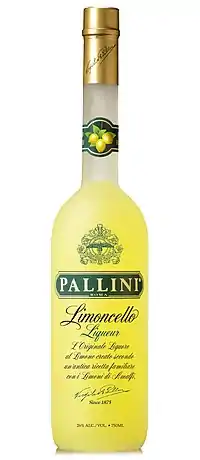Pallini Limoncello
Pallini Limoncello is a brand of traditional Italian lemon-flavored liqueur known as limoncello. It is produced in Italy by Pallini S.p.A. a family-owned and operated beverage company based in Rome, Italy. It is 26% alcohol by volume, 52 proof. The limoncello was introduced in 1999, and is based on a 100-year-old Pallini family recipe. It is imported and distributed in the US by Castle Brands Inc (New York, NY).
 | |
| Manufacturer | Pallini S.p.A. |
|---|---|
| Country of origin | Rome, Italy |
| Introduced | 1999 |
| Alcohol by volume | 26.0% |
| Proof (US) | 52 |
Company history
Nicola Pallini (b. 1851) was a prominent merchant in Antrodoco, a town in the Abruzzi region of Italy. His businesses included coal imports, banking, chesnut farms, and general stores, for which he produced wine and various cordials.[1]
In 1922, the family moved the business to Rome. There it expanded its liquor production, finding success with Mistra', an anise-based liqueur. This is where they began producing handcrafted Romana Sambuca.[2]
In 1962, Giorgio and Nicola Pallini (Virgilio's sons) foresaw the growth potential of Romana Sambuca and decided to move the company out of the centre of Rome to a larger, modern facility, where it remains today.
Living in New York in the 1970s, Virgilio Pallini Jr (current President) negotiated distribution in the US. The effect of this was an explosion of Sambuca Romana. Romana, as well as Disaronno and Galliano, was among the first Italian liqueurs to penetrate US market.
After a few years Romana became the category leader with volumes around 300,000 9 liter case.
Today the brand is owned by Diageo, but Pallini remains the exclusive producer.
In 1999, the Pallini family introduced Pallini Limoncello, based on a traditional family recipe. Two more flavors, Pallini Raspicello and Pallini Peachello were also put into production.
After 10 years Pallini Limoncello is the no. 1 premium Limoncello brand in the world and is distributed worldwide.
Production
Pallini Limoncello is made using sfusato lemons grown on the Amalfi Coast of Italy. The lemons arrived on the coast hundreds of years ago, carried by sailors from the Middle East.[3] They have low acid levels and a delicate flavor, as well as a thick peel, which make them ideal for the production of limoncello.
The lemons are handpicked, peeled and shipped to the production facility in Rome, where the lemon zest is steeped in neutral alcohol derived from sugar beets, making it the most suitable for liquors. This infusion process releases the oils in the zest into the alcohol, which imparts the lemon flavor. Beet sugar and E102 (Yellow 5) is then added to the infused alcohol, and it is bottled and shipped worldwide.[4]
Certifications & Identifications
- PGI organic lemons
- Gluten-free
- Kosher
- GMO Free product
- Allergen (ex 2003/89) free
- Pure natural Italian sugar
Flavors
- Limoncello – traditional lemon-flavored Italian digestif
- Raspicello – liqueur made with a blend of raspberries, blueberries, cassis and black currants (26.0% alcohol by volume)
- Peachello – liqueur made with Italian white peaches (26.0% alcohol by volume)
Recent Reviews
In 2012, Pallini Limoncello received a 92 from the Beverage Tasting Institute,[5] as well as a 91 from the Ultimate Spirits Challenge, in which the brand was "highly recommended."[6] The brand also received a rating of 90-95 from Wine Enthusiast in 2005.[7]
Pallini Raspicello received a rating of 92 points from the Beverage Tasting Institute in 2012,[8] while Pallini Peachello received a rating of 90 points.[9]
References
- "Archived copy" (PDF). Archived from the original (PDF) on 2014-04-23. Retrieved 2014-04-21.CS1 maint: archived copy as title (link)
- "Archived copy" (PDF). Archived from the original (PDF) on 2014-04-23. Retrieved 2014-04-21.CS1 maint: archived copy as title (link)
- New York Times
- Pallini Website Archived 2014-04-22 at the Wayback Machine
- BTI website Archived 2014-04-23 at the Wayback Machine review
- Ultimate Beverage Challenge website Archived 2012-04-01 at the Wayback Machine review
- Wine Enthusiast website review
- BTI website Archived 2014-04-23 at the Wayback Machine review
- BTI website Archived 2014-04-23 at the Wayback Machine review